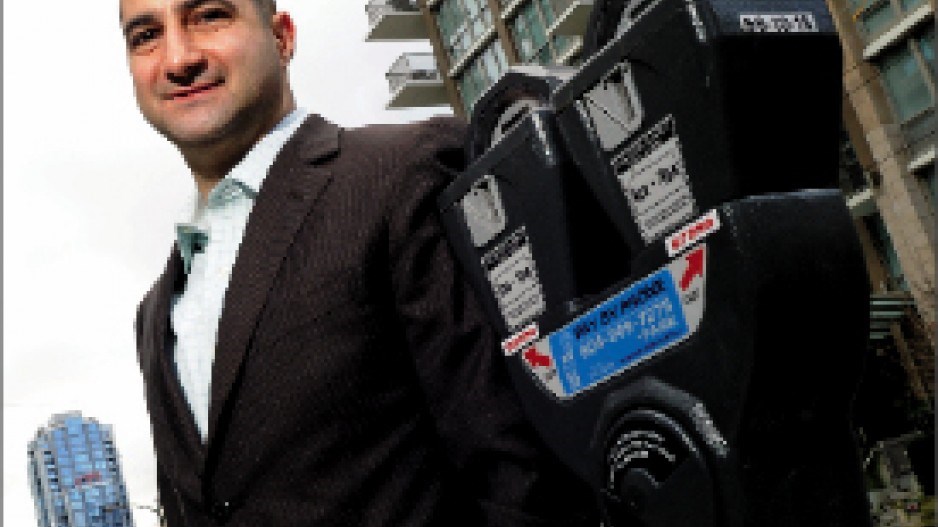The City of Vancouver has made finding a downtown parking spot more challenging and more expensive in recent years – a situation that has been as good for developers as it has been bad for drivers.
Developers rejoice at city policies that allow them to include fewer parking spaces per-square-foot in new office and residential buildings than they had to include a generation ago.
But the parking crunch has become frustrating for drivers because city staff installed meters on 750 free parking spaces last year. The city has also removed 200 metered parking spaces to make way for bike lanes in the past few years. Other metered parking spaces have been eliminated to make way for taxi and loading zones and extended stops for articulated buses.
Developers plan to build a number of new office towers in downtown Vancouver in the next few years and each of the structures will have fewer parking spaces per square foot than nearby office towers built around 1985, when SkyTrain first opened.
Park Place, built in 1984 and managed by GWL Realty Advisors, has 560 parking spaces to serve its 637,000 square feet.
In contrast, Credit Suisse plans to build a 400,000-square-foot tower at 800 West Pender that will have 164 parking spots.
New residential towers also have fewer parking spaces than they did a generation ago.
Hani Lammam, Cressey�s vice-president of development, said his company enjoys city perks that allow it to build fewer residential parking spaces.
One perk gives developers an incentive to give a car-share company:
�free use of a parking stall;
�a car; and
�compensation to maintain the vehicle.
Developers who give either Modo, Zipcar Inc. (Nasdaq:ZIP) or Car2Go those freebies can then eliminate five parking spaces from their residential tower.
Cressey plans to do that at its Meccanica tower in the southeast False Creek neighbourhood and at a tower the company hopes to build at 1349 Granville Street, immediately south of the Best Western Hotel.
Plans for Cressey�s Granville Street tower call for 89 units and 26 parking stalls, of which eight will be designated as shared-vehicle parking.
�We�ve seen car-usage decrease in the last 15 years,� city transportation director Jerry Dobrovolny told Business in Vancouver.
�There are 20% fewer car trips to the downtown, but the total number of trips has gone up. Walking trips are up. So are cycling and transit trips.�
He said drivers made 175,000 car trips downtown in 2011. That�s down from 219,000 in 1996.
Dobrovolny stressed that the city is not requiring fewer parking spots in new developments to deter people from driving their cars downtown.
�We�re doing it to meet demand. If we were doing it to deter [car trips downtown] then we would reduce the parking to below what the demand is.�
But he added that developers are not necessarily required to provide community amenities to compensate for building fewer parking spots.
The city capped the number of downtown off-street parking spaces at 35,000 in 1997. As a result, developers who demolish a downtown parking garage no longer have to replace those parking spots in addition to providing new ones to accommodate occupants in the new development.
Dobrovolny said about 25,000 of the downtown�s off-street parking spaces are rented monthly and 10,000 are rented by the hour.
Metered parking in Vancouver has a peak hourly rate of $6 – that�s $2 more than in New York City.
According to Dobrovolny, the city attempts to keep a 15% vacancy rate for metered parking spaces at peak time. He added that city staff monitor parking use so they can adjust prices and time limits to maintain that availability.
�We�d prefer for people to park off-street.�
Vancouver�s high off-street parking rates result in large part from North America�s highest parking taxes.
TransLink tripled its tax for off-street parking in January 2010, six months before the HST was added. That drove that tax rate up to 35.52%.
The city generates about $60 million annually from:
�street parking levies;
�proceeds from its EasyPark off-street parking facilities; and
�enforcement.
It charges various rates for 6,000 downtown metered-parking spaces to be competitive with off-street parking. Dobrovolny pointed out that in some cases, the city charges drivers a premium for the convenience of being on the street as a way to increase turnover.
�If supply and demand are out of whack,� he said, �it doesn�t make best use of the asset.���




